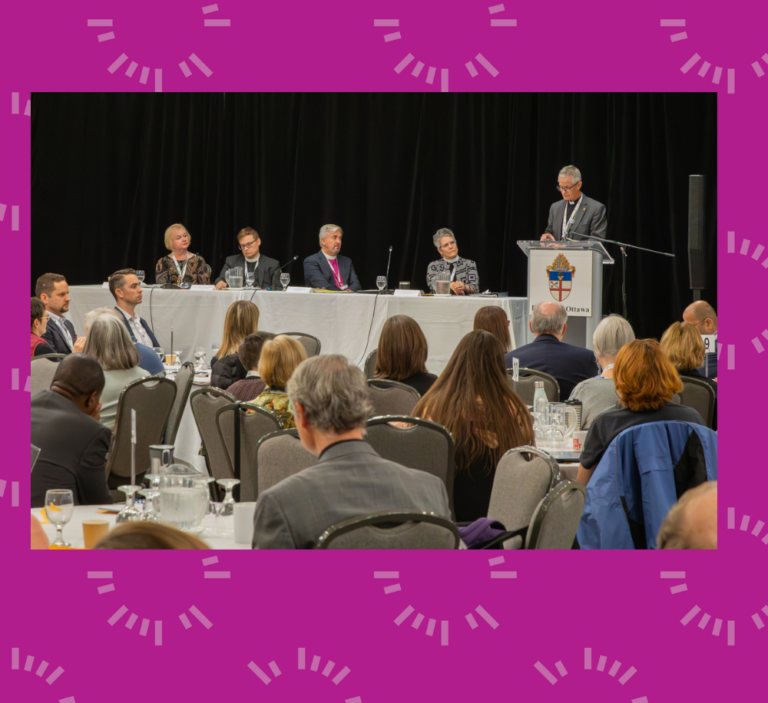143rd Synod of the Anglican Diocese of Ottawa
ADO Synod 2023 Summary Highlights
In his Charge to the Synod of the Anglican Diocese of Ottawa at the opening Eucharist service on October 19, 2023, The Right Reverend Shane Alexander Donaldson Parker used an image from theologian Henry Chadwick who described the church as a stained-glass window. Bishop Shane explained that while the beauty of God grace, love, peace, hope, reconciliation, and justice shines through its colourful panes of glass, “the church needs to be held in this world by the oak and iron of good order and discipline.”
That good order has been a major focus for our diocesan church in a three-year journey of “honestly assessing where we are at, and of carefully and collaboratively discerning what God is calling us to do,” he said.
Shape of Parish Ministry Consultations and The Eleven Actions
During diocesan-wide Shape of Parish Ministry Consultations (SPMC), parishes reported being challenged by volunteer fatigue, property and administrative responsibilities, finances, evangelism, and aging congregations but also spoke of their desire to share God’s love and engage with more people in their communities in new ways. Three proposals were resoundingly approved at Synod in 2022, and in the past year, the Eleven Actions called for in the proposals were developed. At this Synod, the Bishop said, we will see how each of the Eleven Actions has been addressed, listing the hoped-for results:
- There will be less reliance on parish revenues to fund the operating budget;
- Diocesan staff will provide increased assistance and support to parish leaders as they manage parish finances, properties, stewardship, communications, human resources, and administration;
- Our Bishop will provide guidance to parishes facing major changes, and will promote and enable innovation and collaboration;
- Parish officers and leaders will receive training and more learning opportunities, and there will be a clear understanding of how parishes operate;
- A Learning Commons and a Program for Parish Development will provide resources, knowledge, and practical instruction on all essential aspects of parish ministry;
- We will learn how to practice contextual mission as we engage with the world and establish new worshipping communities (NWCs).
Focus outward with humble confidence and expansive generosity
Finally, the Bishop reminded those who attended that “the reason we need to be well-run and well-resourced is so we can focus outward with humble confidence and expansive generosity—as a resource to the wider community around us, sharing in God’s mission to bring the whole world into the orbit of Christ’s love.” (Read Bishop Shane’s Charge to Synod here )
ADO Synod 2023 Guest speaker:
The Very Reverend Canon Richard Sewell
The Very Reverend Canon Richard Sewell, Dean of St George’s College Jerusalem and his wife JulieAnn, who works at the Jerusalem Princess Basma Center (JPBC) travelled to Ottawa to join us. They began the first day with powerful, moving messages about the situation in Israel and Palestine, where war has raged for two weeks, killing and injuring thousands and traumatizing the populations on both sides. JulieAnn explained that the Princess Basma Center, which specializes in rehabilitative work with children who have disabilities, serves people living in both the West Bank and Gaza, but it is often difficult or impossible for their patients to travel to Jerusalem. She thanked the diocese for its support over the years.
Dean Sewell read a letter of greeting from Archbishop Hosam Naoum, Anglican Archbishop of Jerusalem and primate of the ecclesiastical Province of Jerusalem and the Middle East, who was invited to our Synod but was unable to attend. The Dean spoke of the profound trauma and grief cause by the war on both sides and of the shock of the October 17 bombing of the Al Ahli Hospital in Gaza, run by the Episcopal Diocese of Jerusalem. He reported that at least 471 people died, and many others were injured while sheltering in the grounds of the hospital. “We will never forget the people who have died and the assault on our holy ministry to tend to the sick, to heal the diseased and to bind up the injured. It is, in the words of Archbishop Hosam, a ‘crime against humanity’.”
“It is going to be a long hard road towards justice, peace, and reconciliation from here. It will begin by building bridges of understanding and those bridges cannot be built out of hatred,” the Dean said. “Let Christ be our way, our truth and our life, drawing us together in unity so that the world may know that we are the disciples of Jesus Christ.”
The full text of his address is available for download from the ADO website.
Local representatives of The Primate’s World Relief and Development announced that PWRDF has committed $30,000 in aid to the Al Ahli Hospital in Gaza and are accepting donations for their long-standing partner.
The Eleven Actions – Strategic Priorities
Presenters: Jamie Tomlinson & Sandra M. Hamway
Jamie Tomlinson provided an overview of way the Shape of Parish Ministry Consultation (SPMC) resulted in the three proposals resoundingly approved at Synod 2022 and how they transformed into the Eleven Actions that now form the top strategic priorities of the diocese, highlighting a few details from the Actions that are already being developed or implemented:
Action 1 – Building ministry resources and knowledge – Establishing a mutual and collaborative space, online tools to share existing and emerging knowledge, learnings, and wisdom.
The Learning Commons and a Program for Parish Development will provide resources, knowledge, and practical instruction on all essential aspects of parish ministry.
Action 2 – Developing strategies to engage with the world (see Contextual Mission and New Worshipping Communities section below)
Action 3 – Guiding major parish changes – a helpful guide of steps to take and resources available to a parish or congregation and its incumbent, as they embark on major change, has been created.
Action 4 – Stimulating innovation and collaboration – An Episcopal panel is being formed to develop and implement a plan for stimulating innovation and collaboration between parishes.
Action 5 – Reviewing parish fair share (amount now reduced and renamed Proportional Parish Share – see re: Budget presentation below)
Action 6 – Using dividends for parish ministry costs (One of the ways Proportional Parish Share has been reduced is by using dividends produced from an undesignated and Bishop-discretionary trust held by our diocese in the Consolidated Trust Fund towards the costs of parish ministry.)
Action 7 – Bringing clarity to parish governance (increasing understanding of different models of parishes and how they operate) (also see amendments to Canons, Bylaws, and Regulations below)
Action 8 – Training and support for parish leaders (see Parish Advancement Program below)
Action 9 – Providing services to parishes – Diocesan staff will provide increased assistance and support to parish leaders as they manage parish finances, stewardship, communications, human resources, and administration.
Action 10 – Equipping parishes to thrive (This sets out a plan for parish development that will equip congregations with core knowledge and skills.)
Action 11 – Funding parish engagement with the world (see motion on Future Fund below)
Sandra Hamway, ADO director of communications and development, added that communications campaigns will be crafted to raise awareness of these new tools and resources through the new diocesan website, our print newspaper and a soon-to-be launched digital edition, newsletter subscriptions, and social media channels. She noted that the diocesan website will have a second-phase gated portal with a password to keep parish resources separate from information on the public site which aims to appeal to target audiences including, young adults, global Christians, and church seekers.
Synod adopted A Plan for Parish Development (Action 10)
Presenter: The Reverend Kerri Brennan
Parish development is about equipping congregations with core knowledge and skills that are essential to thrive—particularly during times of significant change. Knowledge and resources from diocesan participation in the School for Parish Development will be combined with new educational and training resources to create a program of modules for parish development. The modules will be short (maximum 30 minutes) low-cost, slide-based videos, easily accessible from our ADO website, initially addressing five key areas:
- parish governance
- building healthy communities
- visioning and priority-setting
- effective stewardship
- engaging with the wider community
It is expected the leadership teams (corporations and councils) of each parish and congregation will complete the modules in a timeframe that will be determined later.
Synod approved the Action Plan for Contextual Mission and New Worshipping Communities
The Venerable Mark Whittall, the Reverend Thomas Brauer, Reverend Simone Hurkmans, and Paul Mugarura collaboratively explained the meaning of contextual mission and new worshipping communities.
Archdeacon Whittall explained that contextual mission begins with the question “How is God calling us to proclaim the Good News in our time and our place?” In 2023, in a post-pandemic, multicultural, largely secular culture, the church has to find new ways to engage with the people and communities around us.
The Reverend Thomas Brauer offered an example from the experience of St. James Perth when kids broke into the church basement with their skateboards. The church’s initial reaction was to put up “No skateboarding” signs, but when challenged by a young adult parishioner, it changed course and instead added skateboarding ramps to welcome and engage with the community. Not every effort in contextual mission will lead to an opportunity to create a new worshipping community, but it offers an opportunity to engage, build relationships, and to explore potential.
The vision is that every parish and congregation will initiate or collaborate at least one identifiable new venture by 2028. By 2032, the 135th anniversary of the founding of our diocese, we will have created 35 new worshipping communities, in a great variety of shapes and sizes.
The Action Plan has Six Components:
- A Time of Prayer – Listening for Divine Sparks in our Midst – A diocesan-wide initiative, A Time of Prayer, was launched on the final morning of Synod. It calls on all parishes, groups, and individuals to participate in regular prayer to discern where God wants us to act. The Bishop will appoint a working group to pray for, oversee, and implement “A Time of Prayer.” Each parish and group will identify a point person. Prompts, resources, and prayers will be generated.
- Establishing and overseeing the practice of Contextual Mission – the Bishop, Diocesan Council and other lay and clergy leaders will play an essential role in the support, monitoring, evaluation, and communications.
- Supporting Leaders, Lay and Clergy – with resources such as a knowledge network, qualified coaches, symposia, opportunities to participate in courses and workshops.
- Supporting Parishes and Congregations – with a step-by-step guide to engaging in contextual mission and new worshipping communities; multiple sources of funding and other resources.
- Financial Resources – Parish funds used to support new contextual mission initiatives and NWCs will be exempt from assessment for Proportional Parish Share and a microgrant program will be established to support contextual mission and NWCs and will be financed from the Future Fund.
- Timeline
A Time of Prayer – Listening for Divine Sparks in our Midst – Oct 2023 Launch
Establishing and overseeing the practice of Contextual Mission
- Nov 2023 Contextual Mission Subcommittee appointed
- March 2024 First Quarterly Review of Contextual Mission and New Worshipping Communities
Supporting Leaders, Lay, and Clergy
- Feb 2024 Courses and Workshops for Leaders available
- April 2024 Launch Knowledge Network (peer support)
- June 2024 Coaching for Leaders available
Supporting Parishes
- March 2024 Step-by-step Guide available
- May 2024 Facilitators available
- Sept 2024 Multi-session course available
Financial Resources
- May 2024 Launch first round of microgrant
Synod approved the Proposal for a Future Fund
Presenter: Sandra M. Hamway
Sandra Hamway presented the proposal and first discussed the 2022 Synod to rename and repurpose the existing Second Century Fund as the Future Fund to provide resources for contextual mission and new worshipping communities.
The fund (currently about $1.6 million) will essentially function as an endowment, maintaining its principal while offering about $62,000 in dividends each year for use as microgrants, with some possibility for draw downs on the principal, which will not fall below $1 million. The fund will be overseen by a panel and the Bishop.
Canons, Bylaws, and Regulations
Presenter: Chancellor Canon Henry Schultz
Motion 6, which clarified that once any remaining liabilities of a disestablished parish have been paid, assets of the parish go to the Diocese, and Diocesan Council decides how they will be allocated on the recommendation of the Bishop. It also established that three months after a parish is disestablished, the Bishop or the Executive Archdeacon may act on the Incumbent or wardens’ behalf to transfer property. Chancellor Henry Schultz explained that having this clearly outlined in the CBRs is necessarily legally required and helps with any tax questions. Motion 7 updated the names and mandates of Diocesan Council’s standing committees. Both motions were passed unanimously.
Budget
Presenters: Tracy Albert & Sanjay Grover
Synod approved a balanced budget for the three-year cycle 2024 to 2026. In the presentation to Synod, Tracy Albert, chair of the Property and Finance Committee, said this budget is projecting an overall increase in revenue by about 5% in 2024 to $4.5 million. “We are assuming revenues will decline a little bit in 2025 and 2026. And on the expense side, so true to its name, a balanced budget assumes expenses are kept in line with revenues. And we do assume a growth rate of 5% over 2023, then decrease slightly from 2024 levels in 2025, 2026.”
Of key interest for parishes was the reduction in Parish Proportional Share (PPS renamed from Parish Fair Share). In keeping with a resolution from Synod 2022, PFS was reviewed and reduced by 22% (or about $460,000 collectively.) Albert explained that this decrease is expected to be more than offset by a projected increase in revenues from the diocesan central funds and distributions from the Cathedral Hill Foundation and property income.
Sanjay Grover, director of financial ministry, offered Synod delegates assurance that any money used is from diocesan-owned funds, and parish funds are not involved. More detailed information and graphs are available on the ADO website.
Anglican Community Ministries report
Presenter: The Reverend Canon Peter John (PJ) Hobbs
The Reverend Canon PJ Hobbs, director general of the Anglican Community Ministries, spoke of the challenges the ministries face alongside the vulnerable population they serve.
Describing his long habit of surveying the situation on the streets as he walks through downtown Ottawa, he said he was struck two years ago by the evidence of homelessness and poverty on almost every block. “It was like nothing I had ever seen. I could not imagine it getting worse. Sadly, today it is.” Hobbs spoke about the challenges of dealing with the opioid crisis. “The incident of drug overdoses is on an exponential rise as toxic, deadly drugs are hitting the streets. People are dying. We are struggling to keep people alive for just another day.”
He noted that these problems are not only in Ottawa. In Cornwall, Ont., an estimated 120 people are sleeping in tents or under tarps in three large encampments, and rural parishes have found that people are sleeping on church properties.
The question, “What can we do?” falls squarely within the framework of contextual mission, Hobbs said, recommending learning about the complex problems, volunteering, being an advocate with elected officials. In the broadest and most profound sense, however, he said the answer to the question, “what can we do?” is simply this, be ambassadors…for Christ…. We are called to the greater community, to collaboration and partnership, confident the Spirit moves in our midst.”
Last words
In his final address to Synod, Dean Richard Sewell spoke of the stark contrast between his context in Jerusalem, “the Old World,” where signs of people’s faith are visible everywhere (though also at the root of painful divisions) and the secular, post-religious culture in “the New World” of the West. He offered encouragement to the people of the Diocese of Ottawa in the challenges of offering the love of God and their faith in that context. “I perceived in you a sense of holding on to something that you feel really is very, very precious and … that spark that you want to fan into something bigger. Yes, I did hear a sense and a fear that maybe what you’ve got is so fragile it could actually be lost,” But he said, “The promised world of the post-religious framework has failed to deliver most of those great promises….We live in a world that perhaps, certainly as much as ever, maybe more than ever, needs to hear the gospel that God is love and that Christ has promised to be with us till the end of the ages. We have this heritage and if we keep it sheltered amongst ourselves, we are denying our people the gift that changes the world.”
Bishop Shane concluded with an echo of a message from his Charge about the importance of contextual mission. “We need to learn how to do this. We need to remind ourselves God is already at work in the world, and our task is to participate in God’s work by listening in a new way to the Holy Spirit, because we cannot afford to repeat the colonial mistake of thinking we have the agenda in hand and have to get others to follow it. Instead, we must learn new skills which allow us to discern and understand how the Holy Spirit is already active in the people and communities around our churches. And when we have done this, we then need to ask how God is calling us to use our gifts to enable God’s work in the rural areas, villages, towns, and cities of our diocese.”

Recommended for you:
Related Articles
December 7, 2023
Bishop Shane encourages donations to Diocese of Jerusalem’s Advent Appeal
October 24, 2024


